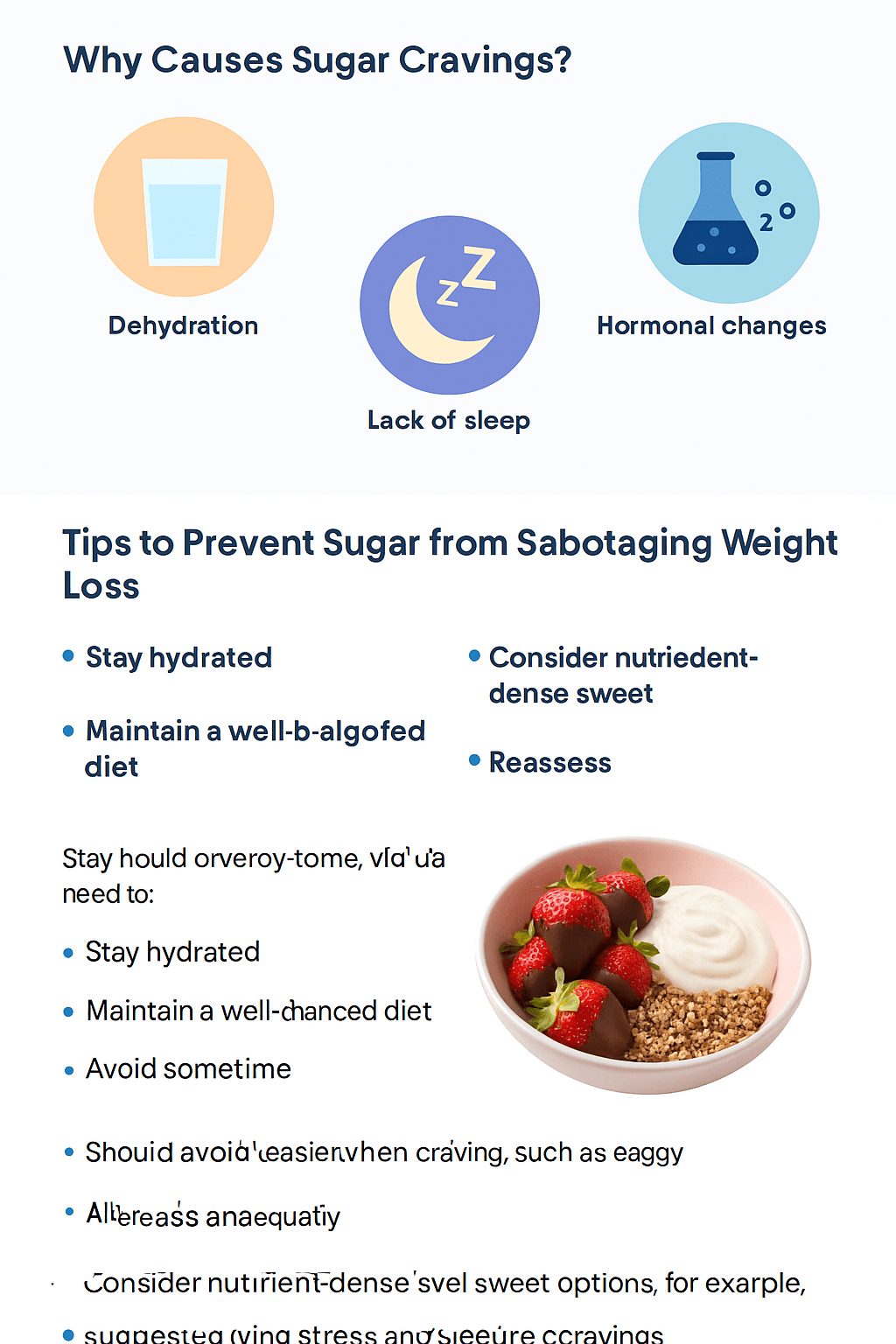Have you ever found yourself reaching for a sweet treat even when you’re not hungry? You’re not alone. Humans are biologically wired to enjoy sweet flavors. Sugary foods trigger the release of feel-good chemicals like serotonin in the brain. Over time, your body adapts and craves more sugar to get the same rewarding sensation.
Unfortunately, this natural love for sweets can interfere with your health and weight loss goals. Let’s dive into why sugar cravings happen and what experts recommend to manage them effectively.

Why Do We Crave Sugar?
Sugar cravings can be triggered by multiple factors, both physical and emotional. Here are the most common causes:
1. Dehydration
Sometimes your body confuses thirst with hunger, leading you to seek out quick energy sources like sugar.
2. Lack of Sleep
Sleep deprivation disrupts how your brain regulates appetite and cravings, often leading to increased sugar intake.
3. Hormonal Changes
Changes during menstruation or menopause can alter cortisol, serotonin, and dopamine levels, prompting cravings for sweet, energy-dense foods.
4. Inadequate Nutrient Intake
If your meals lack sufficient calories or nutrients, your body may push you to find fast energy—and sugar tops the list.
Tips to Prevent Sugar from Sabotaging Weight Loss
Instead of going cold turkey, which can backfire, try these expert-backed strategies:
1. Stay Hydrated
Drink water regularly to avoid mistaking thirst for hunger. Try adding lemon, cucumber, or muddled berries to make it more enjoyable.
2. Eat a Balanced Diet
Include fiber, protein, and healthy fats in every meal to maintain stable blood sugar levels and reduce cravings.
3. Reassess Your Cravings
Before reaching for a sugary snack, pause. Ask yourself: Are you tired? Stressed? Bored? Address the root cause first.
4. Think Nutrient-Dense Alternatives
Cravings don’t have to mean empty calories. Try strawberries dipped in dark chocolate with a side of Greek yogurt for a sweet but nutritious option.
5. Practice Mindful Eating
Don’t eat sweets while distracted. Slow down, savor the flavors, and appreciate your food to feel more satisfied with smaller portions.
What If You Can’t Stop Eating Sweets?
Don’t panic—this is more common than you think. Instead of cutting out sugar entirely:
- Gradually reduce intake: Start by swapping sugary drinks with flavored water or herbal teas.
- Add before you subtract: Introduce more veggies, proteins, and whole grains into your diet so you’re fuller longer.
- Seek expert help: A Registered Dietitian (RD) can offer personalized guidance and creative food swaps that make the transition smoother.
When to See a Professional
If sugar cravings persist or feel uncontrollable, it may be time to consult with a dietitian or a physician specializing in obesity medicine. At RescueMD, our experts can help you identify the root causes of your cravings and develop a sustainable wellness plan tailored to your needs.
FAQs About Sugar Cravings and Weight Loss
Q: Is it okay to have dessert while trying to lose weight?
A: Yes! Moderation is key. Pairing sweets with fiber or protein helps reduce blood sugar spikes.
Q: Are sugar substitutes a good idea?
A: Some sugar substitutes are fine in moderation, but whole foods are always best.
Q: Does exercise help reduce sugar cravings?
A: Yes, regular physical activity boosts mood and helps regulate blood sugar levels, reducing cravings.
Final Thoughts
Craving sugar isn’t a failure—it’s biology. But with the right strategies and support, you can enjoy a sweet treat now and then without compromising your health goals. Ready to take control of your cravings? Book a consultation at www.myrescuemd.com today.